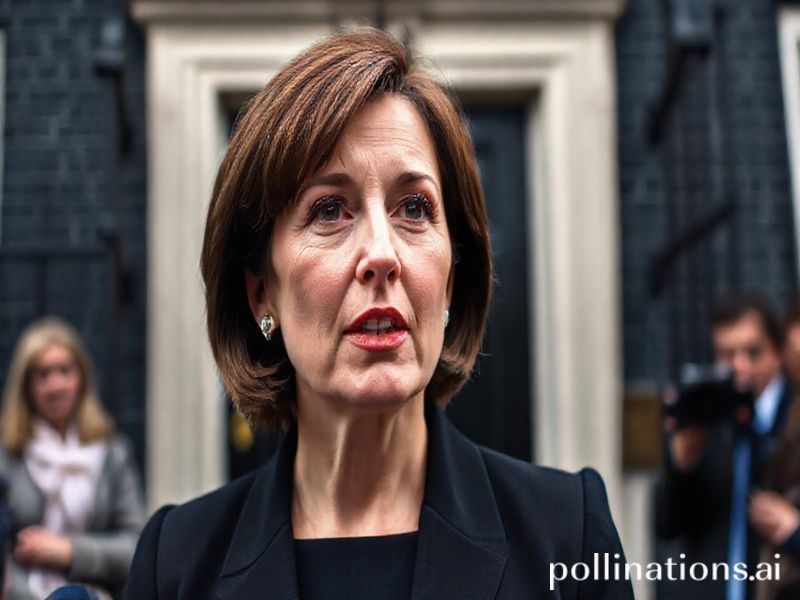rachel reeves
Rachel Reeves and the Art of Global Fiscal Schadenfreude
By Our Man in a Grey Cloud Somewhere over the North Sea
There are moments, usually around 3 a.m. in a hotel bar in Frankfurt, when one realises that the entire planet is simply a vast, badly-run hedge fund with mood lighting. Enter Rachel Reeves, the U.K.’s first female Chancellor of the Exchequer, now charged with convincing international investors that Britain is not, in fact, the fund’s riskiest tranche. The rest of us watch with the detached curiosity of passengers on a burning cruise ship, wondering whether the pianist will finish the song before the sea swallows the deck chairs.
Reeves arrives at the Treasury like Mary Poppins with a spreadsheet and a black belt in Keynesian vengeance. Europe, still hung-over from Germany’s constitutional-court debt drama, raises an eyebrow; the United States, busy refinancing its own $34 trillion party tab, offers a sympathetic shrug; and China, ever polite, refrains from pointing out that it now owns roughly 127 per cent of the world’s concrete. Everyone pretends to care about Britain’s “fiscal credibility,” a phrase that roughly translates to “please keep buying gilts so we can keep pretending the empire is solvent.”
The international significance here is not so much what Reeves does—raise taxes, cut taxes, wear a different coloured trouser suit—but how her choices ripple outward like cheap prosecco spilled on a silk rug. The Bank of Japan, nursing a yen that has collapsed faster than a soufflé in a wind tunnel, quietly hopes Reeves opts for growth-friendly stimulus; the European Central Bank, which has spent a decade perfecting the art of kicking the can while reciting poetry, prays she doesn’t trigger another gilt-market seizure that would send peripheral spreads spiralling. Even Argentina, currently experimenting with chainsaw-based economics, looks north and mutters, “Hold my Malbec.”
Her inheritance is, to use the technical term, a flaming skip. Growth flatlining, inflation sticky, productivity lower than a limbo stick at a Tory party conference, and a bond market that reacts to political headlines like a cat on a hot tin roof. The IMF, staffed by people who once got excited about Excel, has already warned that the U.K. is running the tightest fiscal stance in the G7, which is a diplomatic way of saying the cupboard is not merely bare but has been repossessed by the bailiffs.
Yet Reeves has one priceless asset: the global audience’s desperate desire for a happy ending. Asset managers from Singapore to San Francisco want—need—to believe that somewhere, a grown-up is in charge. It’s the same impulse that drives people to binge-watch Scandinavian crime dramas: the murder is inevitable, but we still hope the detective has a plan. Reeves, with her Bank of England background and centrist vowels, is cast as Saga Norén with better hair. The script writes itself, even if the plot holes are visible from space.
She has already begun the ritual incantations: “stability,” “investment,” “green growth,” and the evergreen favourite “tough choices,” which is politician-speak for “you’ll hate this but please clap anyway.” Watch her at international summits, standing between a French minister who thinks spreadsheets are a lifestyle choice and a U.S. Treasury official who regards compound interest as a quaint European fetish. She smiles the tight smile of someone who knows the coffee is instant and the clock is ticking.
In the end, Reeves matters because she is a test case for the broader question haunting rich-world democracies: can any single finance minister still persuade global capital that national sovereignty and solvency are compatible? Or have we reached the stage where every budget is merely a PowerPoint deck presented to a panel of indifferent bond vigilantes who long ago outsourced their conscience to an algorithm in Connecticut?
Your correspondent, nursing a duty-free whisky, suspects the latter. But hope, like cheap perfume, lingers longer than expected. And so the world watches Rachel Reeves shuffle fiscal deck chairs on the good ship Britannia, praying the iceberg is at least polite enough to send a calendar invite.







